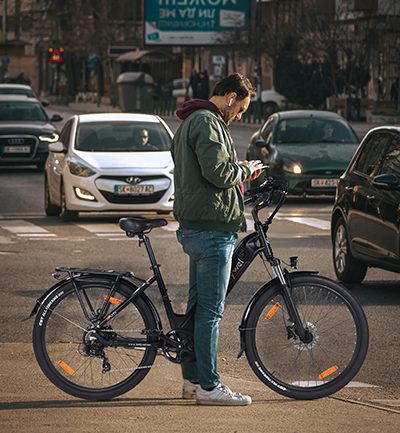As urban centers continue to expand and evolve, the quest for efficient, eco-friendly, and versatile modes of transportation has led to a significant rise in the popularity of electric bikes (ebikes). Among the myriad of options available, two models stand out for their unique blend of innovation, design, and utility: the DYU D3F and the Bodywel T16. Both bikes cater to the modern urbanite’s needs but in distinct ways, reflecting the diverse demands of city living. This comparative analysis delves into the intricacies of these two ebikes, exploring how their features, from portability to performance, align with the multifaceted lifestyle of their potential riders. Whether you’re weaving through traffic-laden streets or seeking a compact travel companion for your daily commute, understanding the strengths and limitations of the DYU D3F and Bodywel T16 could illuminate your path to choosing the perfect ebike.
Design and Portability
Upon first glance at these two electric bicycles, the DYU D3F and Bodywel T16, a striking difference in battery integration catches the eye. This distinction in design philosophy speaks volumes about the diversity in aesthetic preferences and practical considerations that shape electric bicycle manufacturing.
The DYU D3F showcases its battery prominently along the frame, its presence unmistakable, almost as if it’s a design feature in itself. The DYU D3F opts for a battery design that resembles a comma, with smooth, flowing lines and a sleek black finish that lends it a cool, futuristic look. Such an approach not only makes a statement about the bike’s electric nature but also adds a distinctive visual flair that might appeal to those who appreciate their gadgets wearing their tech on their sleeve, so to speak.
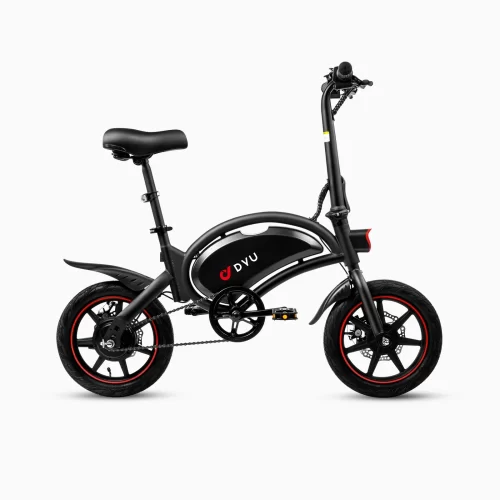
In contrast, the Bodywel T16’s battery is masterfully concealed within its structure, to the extent that one might mistake it for lacking a rear rack for battery placement. While some may prefer the stealthy, integrated look of the Bodywel T16, where the technology blends seamlessly into the bike’s frame, others might be drawn to the DYU D3F’s bold expression of its electric capabilities. This variance in design ensures that there’s something for everyone in the evolving electric bicycle market, allowing personal preference to guide users to the bike that best suits their style and needs.
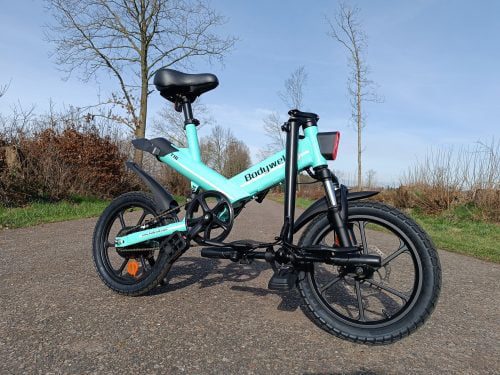
| Feature | Bodywel T16 | DYU D3F |
|---|---|---|
| Motor Power | 250W | 250W |
| Torque | 35Nm | 10Nm |
| Battery | 36V 10.4AH | 36V 10AH |
| Charging Hour | 5-6 Hours | 5-6 Hours |
| Max Speed | 25KM/H | 25KM/H |
| Payload Capacity | 120 KG | 120 KG |
| Weight | 25 kg | 17.24 kg |
| Tires | 16 inch | 14 inch |
| Price | £/€549 | £/€399 |
| Range | Max 70KM with PAS | Max 60 KM with PAS |
| Suspension | Front Suspension | No |
| App Control | Yes | No |
Comfort and Ergonomics
Both bikes prioritize rider comfort, but they approach it differently. The Bodywel T16 emphasizes adjustable components and various shock absorption components for a more tailored riding experience, ensuring comfort and ergonomics for riders of various heights. It is equipped with front fork suspension, seat suspension, and mid-frame suspension, so when you ride, there are three layers of shock absorption continuously mitigating the discomfort of bumps. Moreover, its 16-inch tires and the option for an extended seat post offer greater inclusivity for rider height (suitable for people in 160-200cm height).
In contrast, It’s noticeable that the DYU D3F lacks explicit shock absorption features, with only the seat offering some level of cushioning. Its upgraded version, the D3+, comes equipped with additional shock-absorbing components. If you live in a city with good road conditions and your commute is short, then this ebike could be a consideration. Otherwise, you might find that your rear and palms become quite uncomfortable after riding for a while. Moreover, although detailed information about the recommended rider height is not provided on its official website, generally, the 14-inch tires paired with a smaller frame size do not offer as broad a range of suitability as 16-inch bikes do. DYU D3F’s 14-inch wheels design is more suited to casual riders or those looking for a compact solution, possibly at the expense of some ergonomic benefits for taller or larger riders.
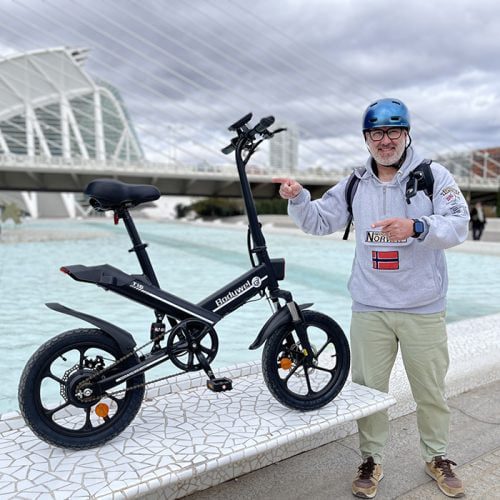
Performance and Range
When it comes to performance, both ebikes offer features tailored to the urban rider. Both ebikes are equipped with a nimble maneuverability that shines in the tight confines of city streets, thanks to its small turning radius.
The DTST+ Attitude Sensing algorithms of DYU D3F states that you can get more power in the same condition. However, its battery supports a commendable max range of 60km with PAS, making it suitable for short to medium-distance commutes. Similarly, the Bodywel T16 features a powerful electric motor that allows for speeds up to 25km/h, coupled with an impressive battery range that can support longer commutes of 70km without needing a recharge.
We can find that the battery specs of the two ebikes are comparable but Bodywel T16’s range is longer than DYU D3F’s. The range an electric bicycle can achieve on a single charge is not solely determined by the battery’s capacity; it is intricately linked to the bike’s drivetrain efficiency and the brand and quality of the battery itself. Thus, when selecting an electric bike, it’s imperative to consider these factors collectively.
Simplicity of use
When it comes to the practice, the torque, app control and display features of the Bodywel T16 and the DYU D3F, have distinct differences that cater to different user preferences.
– The Bodywel T16 offers a torque of 35Nm, which is a measure of the rotational force the motor can provide. Higher torque can translate to better acceleration and climbing capabilities, especially useful for dealing with hills or quick starts at traffic lights.
– The DYU D3F provides a lower torque of 10Nm. While this may be adequate for flat terrain and smooth riding, it might struggle somewhat with steeper inclines or demanding riding conditions.
– The Bodywel T16 features app control functionality, offering the rider additional convenience and monitoring capabilities. An app can provide a wide range of features from tracking your rides, to adjusting bike settings.
– The DYU D3F does not have app integration, which means it lacks the ability to interact with a smartphone for enhanced control or data monitoring.
– The Bodywel T16 equips a big LED display. Such a screen boils down multiple parameters into a single screen, and you can check speed, battery, faults and more from a single screen without having to be distracted by pressing buttons to switch pages multiple times during a ride.
– The DYU D3F only comes with an LCD screen to display battery level and shows fewer riding parameters. This makes it difficult for the rider to determine the source of the problem on their own when they want to record the status of their ride or if the bike is malfunctioning.
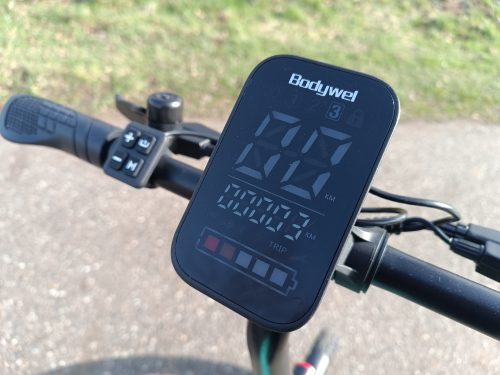
The Bodywel T16, with its higher torque, app control and bigger display, is geared towards a rider looking for a more robust performance and tech integration. In contrast, the DYU D3F, with its basic setup, might appeal to those who prefer a more straightforward ebike experience without the need for additional technological enhancements.
Price and Value
Price is a crucial factor for many buyers. The DYU D3F offers an affordable entry point into the world of ebiking without skimping on essential features. It’s normally priced at £/€549 and is currently available for just £/€399 at the Spring Event.
The Bodywel T16, while possibly commanding a higher initial investment, justifies its price with a longer battery range, higher load capacity, and additional comfort and safety features. Normally priced at £/€699, the current event price is £/€549, and new users can also use a 10% discount code to bring the final price to just £/€494.
How to choose the one suits you?
When choosing between the DYU D3F and the Bodywel T16, it ultimately comes down to your personal preferences and daily requirements. The DYU D3F may cater to those seeking a lightweight and more economical option, particularly if your commute is on smoother, flatter terrain. On the other hand, the Bodywel T16, with its longer range and suspension features, might be the better fit for those looking for comfort on varied urban pathways and a bit more assistance on their ride.
Decisions hinge on these nuances that define an ebike’s personality and how it aligns with your lifestyle. Both options stand as capable companions on your urban journeys. Consider what matters most to you—whether it’s the journey, the destination, or the versatility of your ride. If the features of the Bodywel T16 resonate with your riding style, it could well be the worthy candidate for your next urban adventure.


